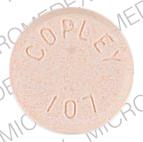Mebendazole Disease Interactions
There is 1 disease interaction with mebendazole.
Mebendazole (applies to mebendazole) liver disease
Moderate Potential Hazard, Low plausibility.
Although mebendazole is poorly absorbed from the gastrointestinal tract (only 2% to 10% of a dose is absorbed systemically), absorbed drug is primarily metabolized by the liver. Therapy with mebendazole should be administered cautiously in patients with liver disease. Liver function tests should be monitored during extended use or high-dose therapy, since elevation of serum transaminases (AST, ALT) and GGT, as well as rare cases of hepatitis, have been reported during prolonged therapy and at dosages substantially above those normally recommended.
References
- Bekhti A, Pirotte J (1987) "Hepatotoxicity of mebendazole: relationship with serum concentrations of the drug." Gastroenterol Clin Biol, 11, p. 701-3
- Witassek F, Bircher (1983) "Chemotherapy of larval echinococcosis with mebendazole: microsomal liver function and cholestasis as determinants of plasma drug level." Eur J Clin Pharmacol, 25, p. 85-90
- (2002) "Product Information. Vermox (mebendazole)." Janssen Pharmaceuticals
Mebendazole drug interactions
There are 10 drug interactions with mebendazole.
More about mebendazole
- mebendazole consumer information
- Check interactions
- Compare alternatives
- Reviews (8)
- Drug images
- Side effects
- Dosage information
- During pregnancy
- Drug class: anthelmintics
- Breastfeeding
- En español
Related treatment guides
Drug Interaction Classification
| Highly clinically significant. Avoid combinations; the risk of the interaction outweighs the benefit. | |
| Moderately clinically significant. Usually avoid combinations; use it only under special circumstances. | |
| Minimally clinically significant. Minimize risk; assess risk and consider an alternative drug, take steps to circumvent the interaction risk and/or institute a monitoring plan. | |
| No interaction information available. |
Further information
Always consult your healthcare provider to ensure the information displayed on this page applies to your personal circumstances.


